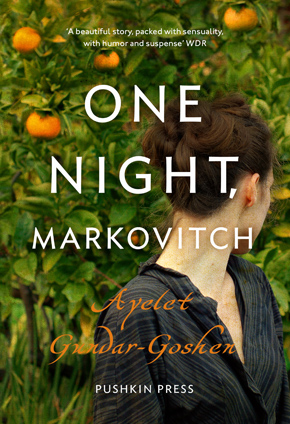The poet
by Ayelet Gundar-GoshenBella Markovitch spent an entire year in the home of the poet. Several days after their first meeting, she got used to the chopped liver smell, and now smelled it only when they fought. Every morning, after the poet left for work, Bella packed all her clothes in a bag and was ready to leave the house. Sometimes she opened the door and walked down a few steps of the staircase, sometimes getting as far as the end of the street. And sometimes she didn’t do even that, but only stood in front of the closed door for several moments before she unpacked the bag.
The poet knew nothing about that morning ritual. When he returned from his job at the newspaper, after spending most of his day writing obituaries and an occasional congratulatory item, he found Bella bathed and fragrant. He took her to cafés and films, strolled along the avenues with her and even agreed to dance with her, because although he hated dancing, he loved the looks people gave him when then they saw a man like him dancing with a woman like her. But one day he found out how great the gap was between her happiness at night and her sadness during the day. It was on a morning in February, when the buildings on the street press up against one another because of the cold. The poet, who had left his apartment with only a thin jacket and the ardor of love to preserve his body heat, realized very quickly that the ardor passed and his shoulders shook. He turned around at the corner and headed back to the house, where he would wrap himself in a warm coat and another hug from his beloved. As he neared the building, he saw Bella standing in the doorway, her expression clouded, her suitcase in her hand. The poet froze where he stood. The man inside him wanted to break away from that spot, to run towards her, to kneel before her and beg her to stay. But the artist in him ordered him to remain where he was and watch, to engrave in his mind the features of her face on the day she left, a face unaware that it was being observed, a face he could write poems about until the day he died. As the artist and the man struggled with each other, Bella turned around and went back into the house, and the poet walked to work, confused, hurt and freezing.
All his poems, simple, spare, touching, were about the possibility that one woman might leave one home. It wasn’t great poetry, far from it, but neither was it terrible poetry, and that was something new.”
And from that day on, he resumed writing poetry. He no longer wrote about the Jewish revival or sang the praises of agricultural crops and the landscape of the country. All his poems, simple, spare, touching, were about the possibility that one woman might leave one home. It wasn’t great poetry, far from it, but neither was it terrible poetry, and that was something new. The day the poet watched Bella as she stood in the doorway of the house became the day he moved from being a failed poet to a mediocre poet. At the time there were more than enough great poets in the country; nor did it lack for terrible poets. The great ones were idolized, the terrible ones pitied. But the mediocre poet was a source of great happiness. His poems were printed in newspapers, but his books were rejected by publishers; he was invited to address unimportant conferences and everyone knew they would not have to name a park after him, only a bench at the most.
Bella did not read the poet’s poems. Since the day she had tasted the orange sections, she had lost faith in words. In the past, she had loved poets because she thought they had the power to create worlds that people would want. Today she knew that those worlds were nothing but round soap bubbles like the ones that rose from the water when she washed the poet’s laundry in the sink. Lovely, colorful bubbles that your body wants to cradle itself in, but they burst immediately in a spray of water, leaving behind only dirty socks and shirts that had to be scrubbed with soap.
Women began to want to be close to the poet. Beautiful women. His earlier poems, the Zionist poems about redeeming the land, had left them indifferent. Now their eyes filmed over with tears when they read his poems to his beloved. The poems touched the most delicate chords of their soul – their desire to one day be the object of a poet’s love. Bella could feel it when she walked hand in hand with the poet of an evening. No longer did he wait for her every smile, but spread smiles of his own; no longer did he stare into her eyes, but looked around at other women, from the redhead to the brunette, from the brunette to the buxom one. When they returned to the poet’s apartment, Bella still felt the nausea she had felt in the morning. That day she had not packed her things, but remained near the toilet from one bout of vomiting to the next. She vomited up the cake she had eaten the previous night in the café, and the expressions of the women who had watched her as she ate. She vomited up the Hebrew poet, who now preferred writing about her leaving to actually being with her. She vomited up all the orange sections she had eaten in Europe without tasting them because her tongue had tasted only the anticipation of seeing the country the oranges had come from. And she vomited up the country itself, bits of food that had not been properly digested, khamsin and sand and wretchedness and futile hopes.
When she finished vomiting, Bella lay down on the bed and suddenly felt as light as a bird in flight. Even the burning in her esophagus was pleasant. Now she knew that she was free to do whatever she wished. Yaacov Markovitch could rot in his house in the village; she herself would live here, in Tel Aviv. That very day, she would leave the unfaithful poet and find herself a true love. A good, simple person who had no room in his life for poetry, whose feet were planted firmly on the ground. A doctor. Perhaps a clerk. A modern man who did not consider marriage at all important. And she also decided to register at the teachers’ college, to teach the children of Israel not to submit to baseness and infidelity, which apparently were deeply rooted in the men of this country. They would speak to her in an embarrassed, admiring voice and she would teach them everything they needed to know. Mathematics, history, geography. She would teach them about the towering Himalayas and the history of the Jews in the kingdom of Spain. About the sum of the angles in a triangle and the anatomy of a flower. The only thing she would not teach them was poetry. The falseness of words was too dangerous for young people. They would treat her with respect and she would never raise a hand to them. When she walked in the street with the doctor, or the clerk, mothers would come up to her to shake her hand and thank her.
As light as a bird, except for the faint burning in her esophagus, Bella Markovitch lay on her back and made plans without knowing that the next morning she would again find herself leaning over the toilet, and the day after that as well. She would endure more than two weeks of nausea and vomiting before she realized that vomiting was not the mind’s way of cleansing itself of its past, but the body’s way of heralding the future.
Extracted from One Night, Markovitch, translated by Sondra Silverston.
Ayelet Gundar-Goshen was born in Israel in 1982. She holds an MA in Clinical Psychology from Tel Aviv University, has been a news editor on Israel’s leading newspaper and has worked for the Israeli civil rights movement. One Night, Markovitch, her first novel, won the Sapir Prize for best debut, and is now published by Pushkin Press. Read more.
Sondra Silverston has lived in Israel since 1970. Her other translations include fiction by contemporary Israeli authors Etgar Keret, Amos Oz, Eshkol Nevo, Savyon Liebrecht and Aharon Megged.



